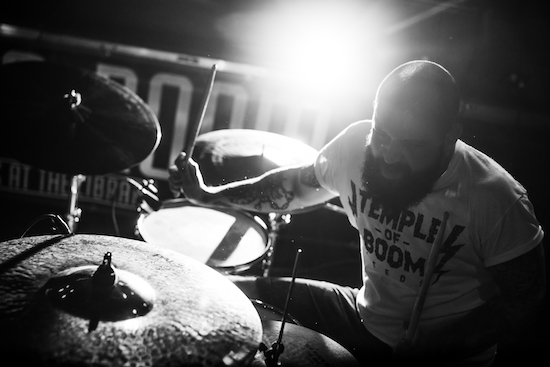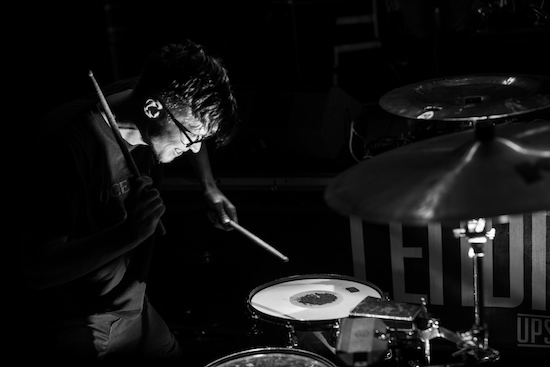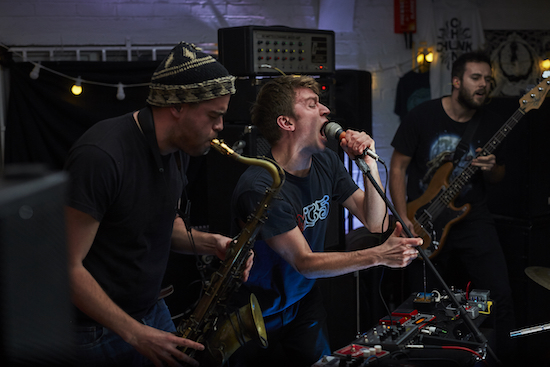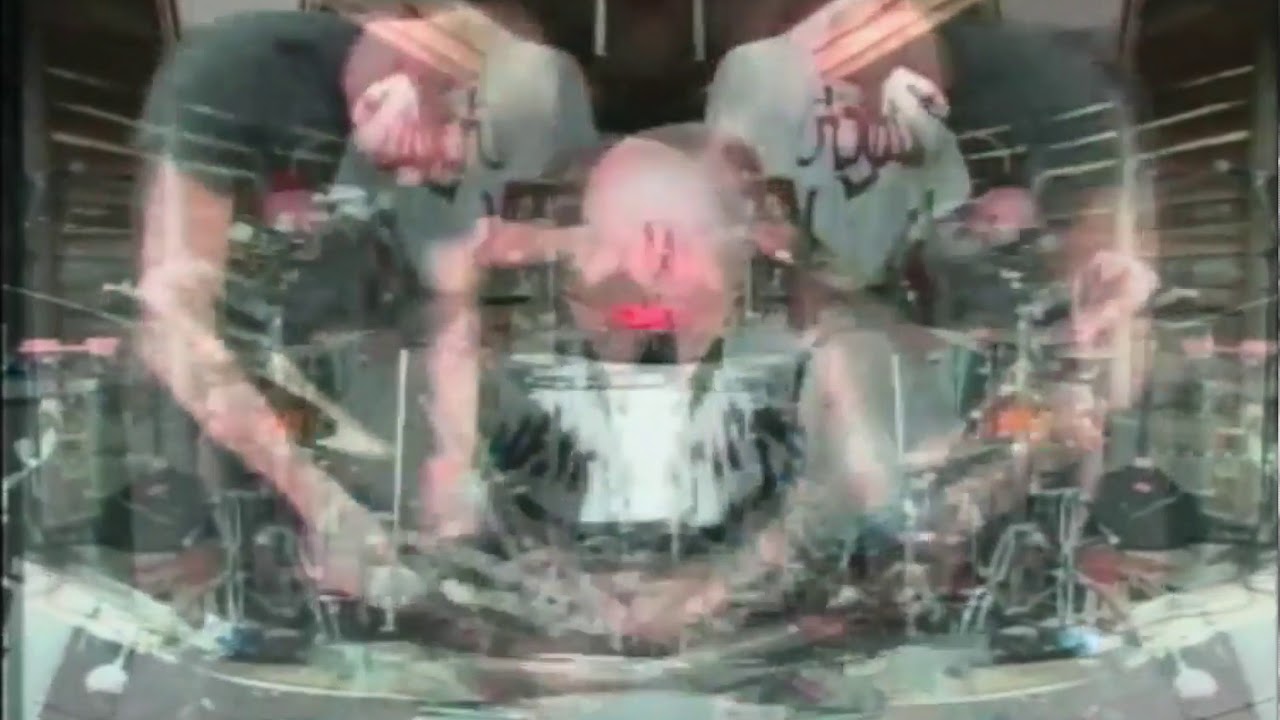All photographs by Howie Hill
"The main components of Cattle are rhythm and noise," says lead singer Chris Riviera with a frankness typical of the group. The Leeds quintet occupies that rare space where an utter lack of pretence and theatrical noise-rock volatility intersect.
Take, for instance, their recent set at the Supernormal Festival as captured by Islington Mill Public Access TV. If you haven’t seen it, there’s a sort of shed with a grass roof sat in a clearing. Cattle are crammed inside, stationed at their respective instruments. It seems too small by about twenty percent.
Two drummers crowd the front of the stage, the singer is pushed to one side behind a small assortment of pedals and a theremin, while the bassist and saxophonist lurk near the back. Almost immediately, the band launches into an intense set of ecstatic noise, saxophone skronk, and highly percussive, sludgy grooves.
Riviera throws the entirety of his body into his howls, each of which is processed into a tumult of echo, before pausing to deliver a heartfelt anecdote about tearing up while watching preschoolers crowdsurf at the festival the night before.
The look of joy on his face is infectious as he says, "I wish I could have come to something like this when I was a little kid. I’m jealous of you, even though you’re four years old." Then, he’s screaming again. This is the micro moment that pulls the macro into focus, allowing us see what Cattle is really about: different people taking delight in coming together to make and appreciate a gnarled racket.
Riviera, drummer Steve Myles, and bassist Tom Goodall tell me about growing up in a new wave household and becoming obsessed with record collecting, being raised by gigging musicians, and a jazz-head Dad and Black Sabbath Mum, respectively. Eventually, the band sends me a list of each member’s primary influences: Fela Kuti and MC5, Big Business and Godheadsilo, Corrupted and dälek, LCD Soundsystem and Brand New, The Mars Volta and Wayne Shorter. All of the above goes a long way toward breaking down Cattle’s excellent debut LP, Nature’s Champion.
And honestly, that stuff is all accounted for, however warped or mangled across the album’s thirty minutes. On ‘Moon Crawl’, its last and best track, the sum of those influences is a burly, perverse, sax-forward concoction that winds up sounding something like a cross between Harvey Milk and Maximum Joy.
I caught up with the band – Riviera, Goodall, Myles, drummer Jambo Simpson, and saxophonist Miles Spilsbury – via the internet to talk about their lineup, Nature’s Champion, upcoming collaborations, DIY, and more.
So how did Cattle land on its distinctive mix of instrumentation?
Chris Riviera: It happened by accident, as opposed to design. At one point we had a single drummer, bass and vocals, then we decided that you can be noisy as you like as long as the rhythm is infectious.
Steve Myles: It’s a good laugh to step outside of the traditional power trio format. A bunch of my favourite bands go down that route, but messing with the standard keeps you on your toes. Playing alongside another drummer is a completely different experience, too. Most drummers have their own way of approaching things, and stepping into someone else’s headspace puts a fresh spin on the way you write stuff.
One of the things I love about Nature’s Champion is that there are scores of references and points of ingress, but it’s also claiming distinct sonic territory. I’m curious about where you guys were coming from when you made the record?
Tom Goodall: I feel like our songwriting is fairly malleable and the output relies heavily on a combination of things. We write a lot in the spur of the moment at practice. The spontaneity of doing it this way can actually benefit the longevity of an idea. On the other hand, we’ve also written songs via the music equivalent of smashing a cube into a circular hole.

I’m curious about what’s going on thematically with Nature’s Champion. If one is thinking earnestly or politically, it’s pretty easy to infer some things from the album title and cover art alone.
CR: A lot of the themes deal with looking inwards as opposed to external topics. The lyrical content on the album revolves around managing anxiety, obsessive compulsive disorder, being wrong about important things in life, and finding a release in art and nature. The cover art by Mike Winnard was meant to reflect a time where technology has ended, which in some respects is a nice thought, given the stress and pain that this brings to a lot of people’s lives – even if they aren’t conscious of it.
Is it important for you to capture the performative aspect of Cattle on record?
CR: I think it’s always a totally different medium—like a book versus film debate. Live, you can see a moment where a drummer might drop a stick and manage to catch it, or a singer drenched in sweat totally losing it, and you go, "Whoaaa." Obviously, we want the records to try and capture as much energy as possible, but the nice thing about a record is having loads of time to sit down and work things out in very specific detail. Playing live sometimes can be very broad brush strokes or like a rescue mission, where you are trying to salvage the songs before they completely fall apart.
It’s been nearly a year since the release of Nature’s Champion. What’s next in the pipe? Any other projects you guys are working on that we should be aware of?
SM: There’s the two collaborative EPs that we’ve been working on. The first is a live recording of a collaboration that we did with our mate Girl Sweat during the summer, which has got a kind of repetitive, psych vibe to it. We rented out the room at an awesome art and event spot in Armley called Assembly House, and got our good mate Ross Halden of Ghost Town Recording Studios to come down and record the whole thing in front of an audience. Still waiting to hear when we’ll be able to put it out, but it’ll be getting released on 12" at some point.
The second collaboration we have lined up is more on the experimental hip hop side of things with Algernon Cornelius. We’ve only written a couple of tracks so far, but there’s a definite Death Grips versus Zu feel to it. We’re aiming to have that recorded early next year. I’m dead excited about that one – Marcus is a mint producer and his knowledge of music is staggering.
Aside from that, we’ve started writing for the second album. It’s a bit darker than Nature’s Champion so far, although we’ll see how it turns out. We’re not really in a mad rush with any of it, though. We’re happy just trotting along at our own pace.

Obviously, the material returns from making any sort of art have all but evaporated or been "disrupted". What keeps you doing it?
SM: It’s a proper important part of my life, turning up at a spot and spending the evening watching your mates play, the thrill of nailing a set, the determination you get to improve if you play a clanger, and the buzz you get when your mate’s band gets offered something cool. It’s more about community than anything else really.
CR: Have you seen the animated Robin Hood? You know the scene where the sheriff comes to the church and bangs on the kid’s cast to take the last gold coin from them? That’s what playing in a band is like from a money perspective. You pay for practice, travel, gear, etc., etc., and at the end the sheriff comes and bangs on your cast for the last gold coin. Honestly, though, the money isn’t important in the slightest. Even if I never made a single penny out of bands, I wouldn’t care. I’ve got some incredible memories that I’m going to have fun boring my kids and grandkids with by repeating them over and over and over.
SM: Getting to play your music for other people should always be treated like the precious thing that it is, not as some kind of burden that you need to be compensated for. It’s far too easy to get bogged down trying to get to the next level without noticing how amazing everything that you’re already experiencing is.
Is there a Cattle philosophy?
CR: "Mind on my money and my money on my mind." Ha, not really. There isn’t a philosophy, but one of the central themes in the lyrics and the artwork is about stripping away every external thing of irrelevance and concentrating on simple things like nature and friendship. Really trying to live as minimally as possible.
SM: As far as a band philosophy goes, I guess we’re just really lucky to be in a position where we see the value of doing this kind of thing. The DIY scene is sick because, unlike others, it thrives on inclusivity instead of competition. When you get a bunch of folks together outside of the usual pissing contest that most other walks of life are, then you get to meet them properly.
CR: My life looks completely different compared to how it was when it was younger. I wasn’t always surrounded by amazing, creative people like I am now – things felt a lot bleaker. But having a creative outlook like Cattle, having made some great friends along the way, and being able to make music with people I love and have other people hear it is like a dream come true. So when I’m playing live, although part of it might come from an angry place, as cheesy as it sounds, a lot of it comes from the place where I’m a little excited kid yelling out, ‘This is the noise I make, these are my friends, and I fucking love being alive.’



